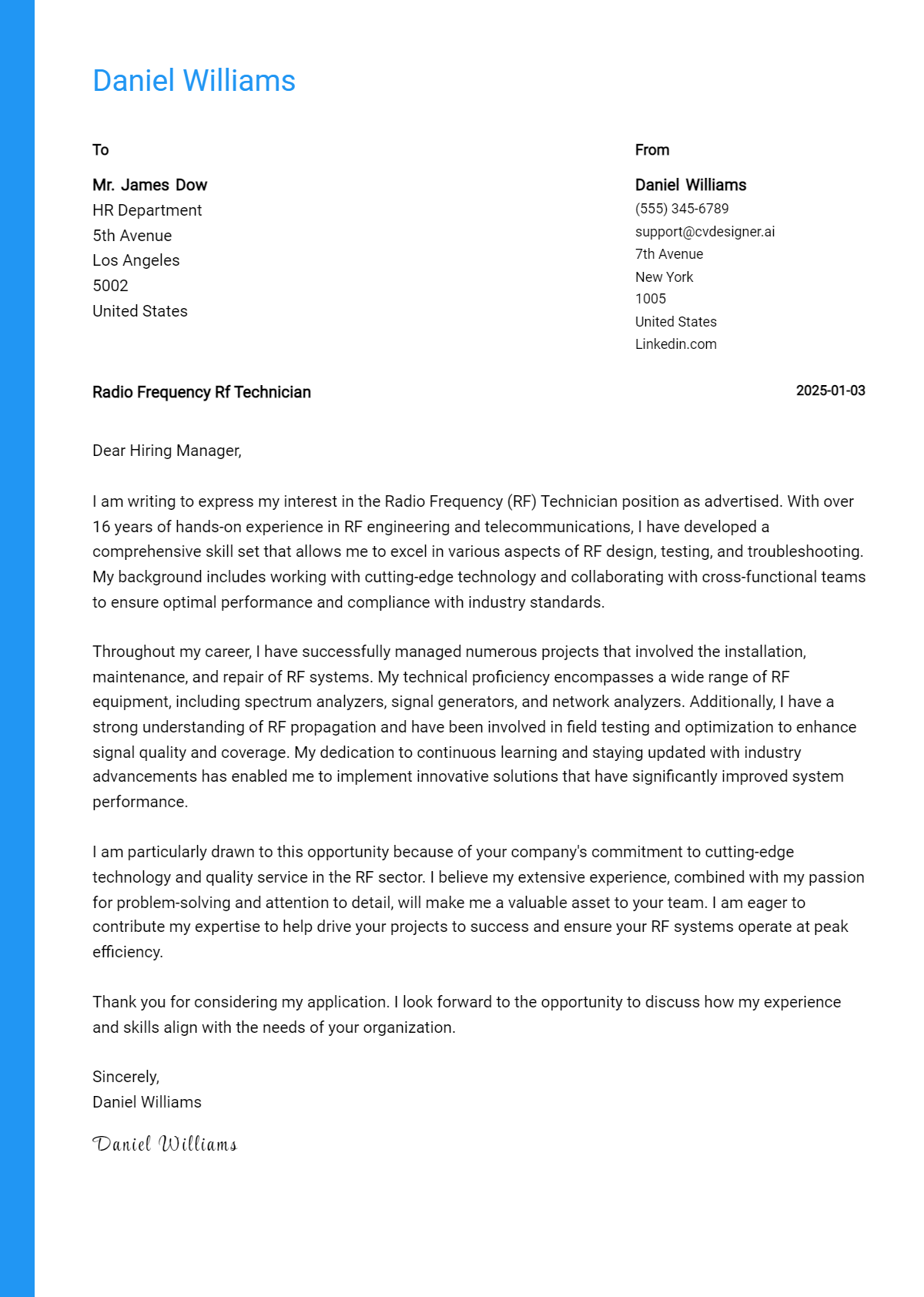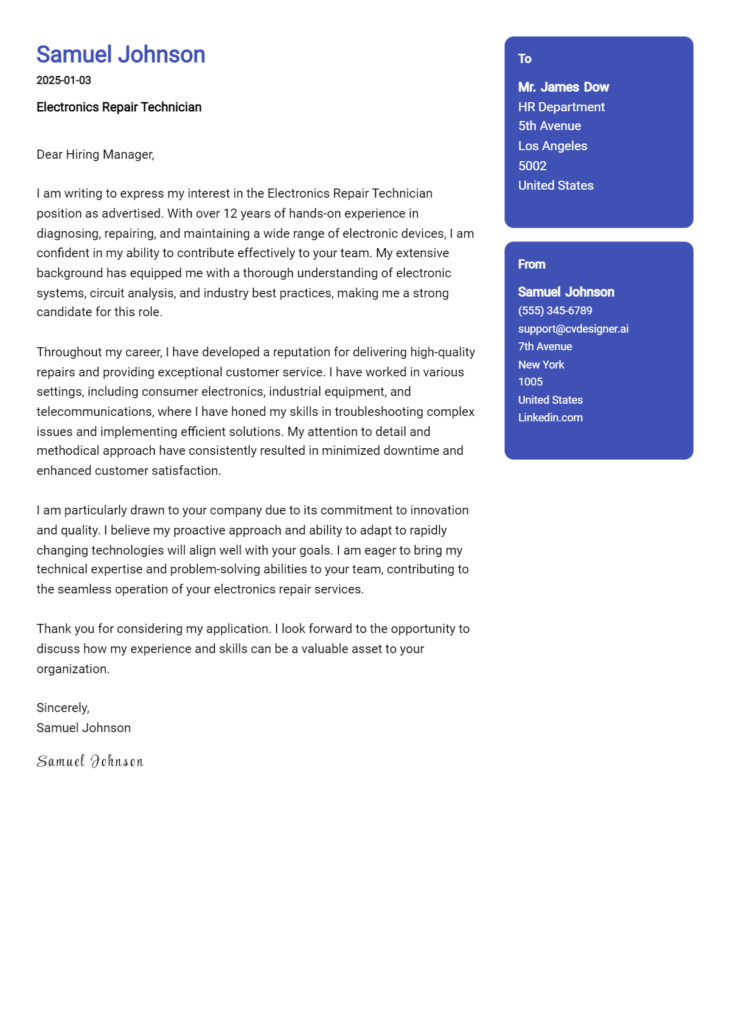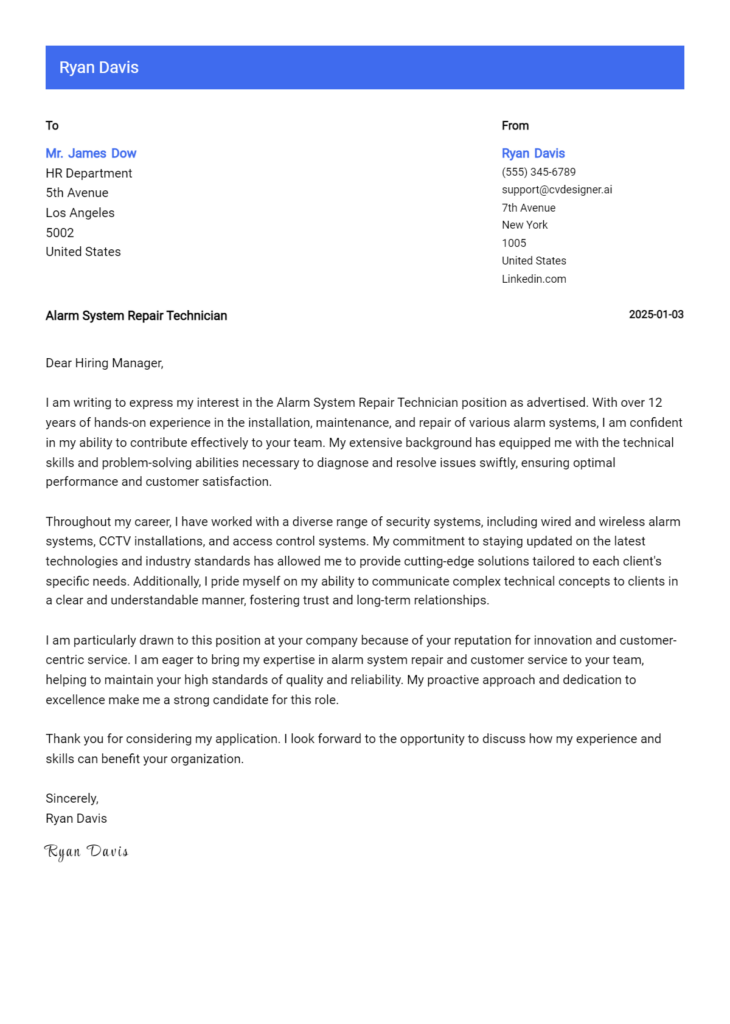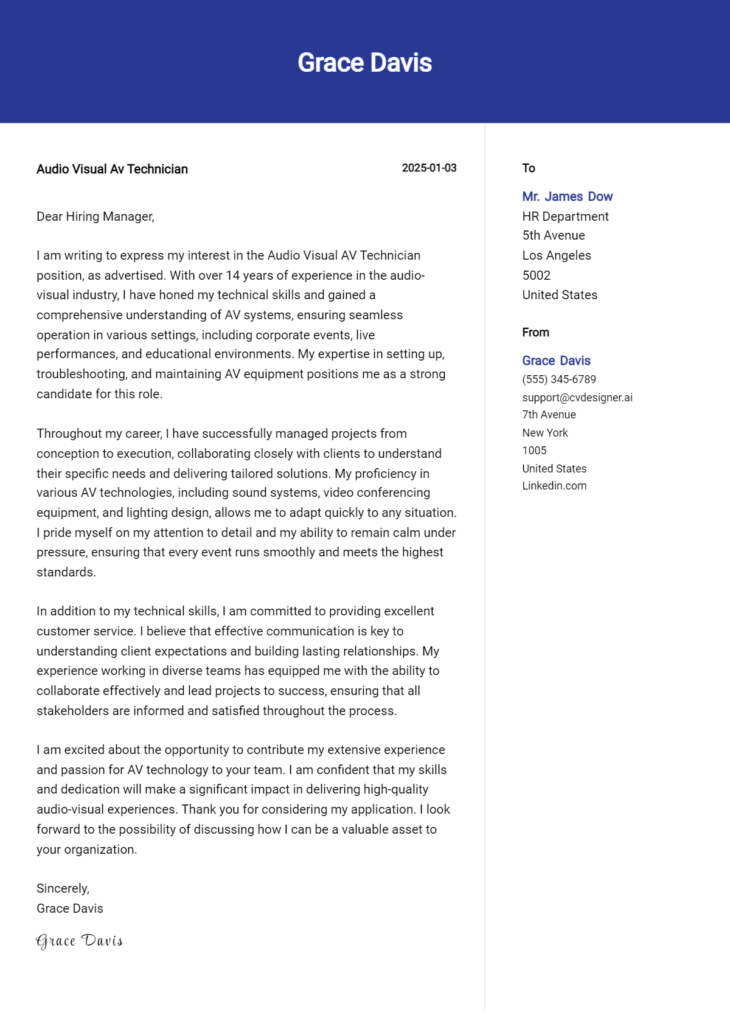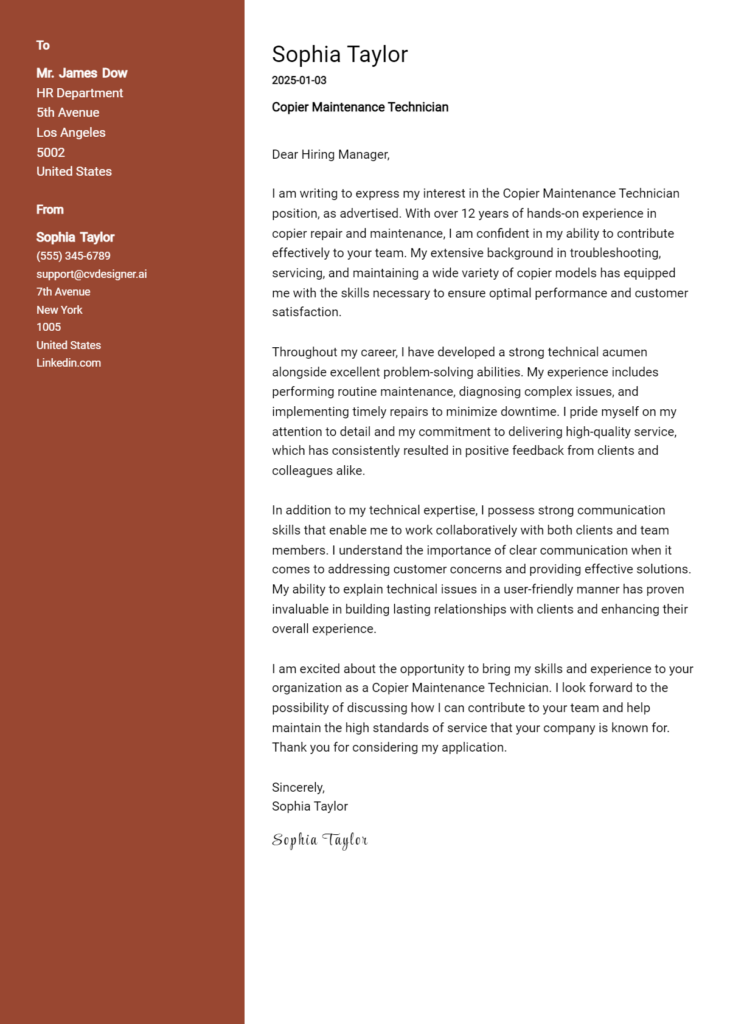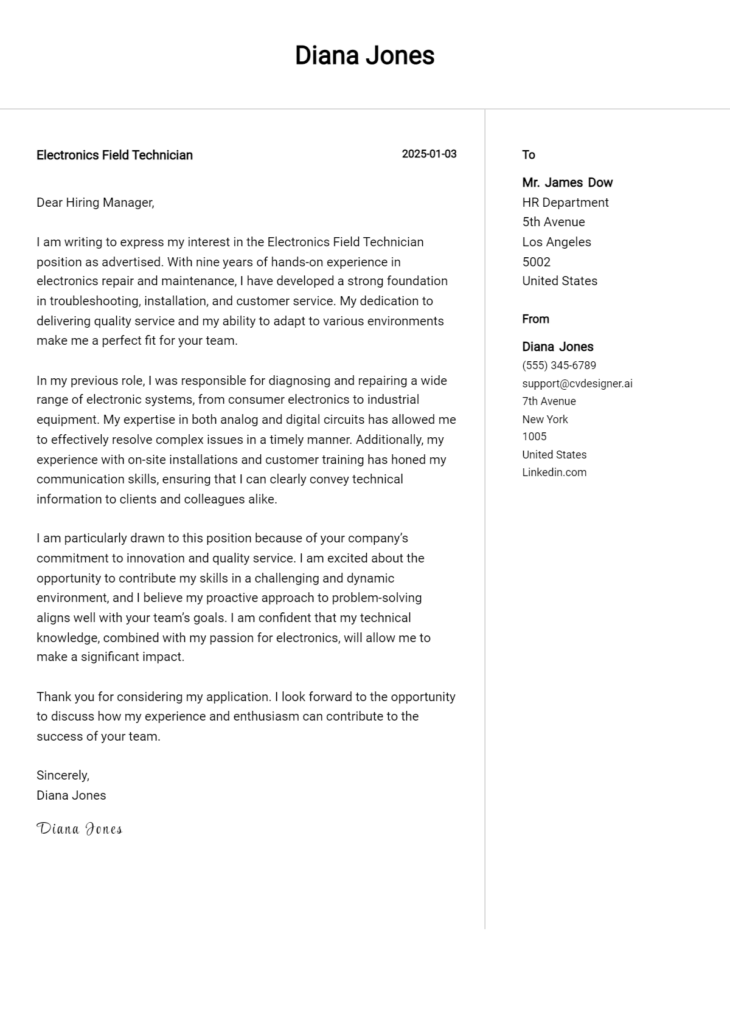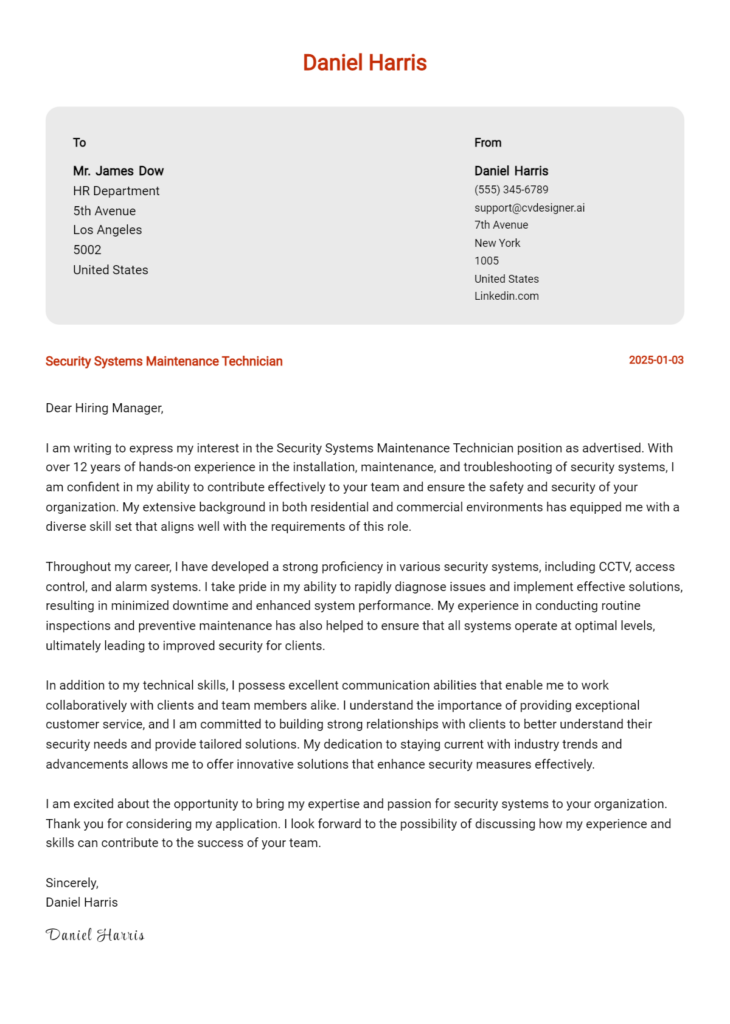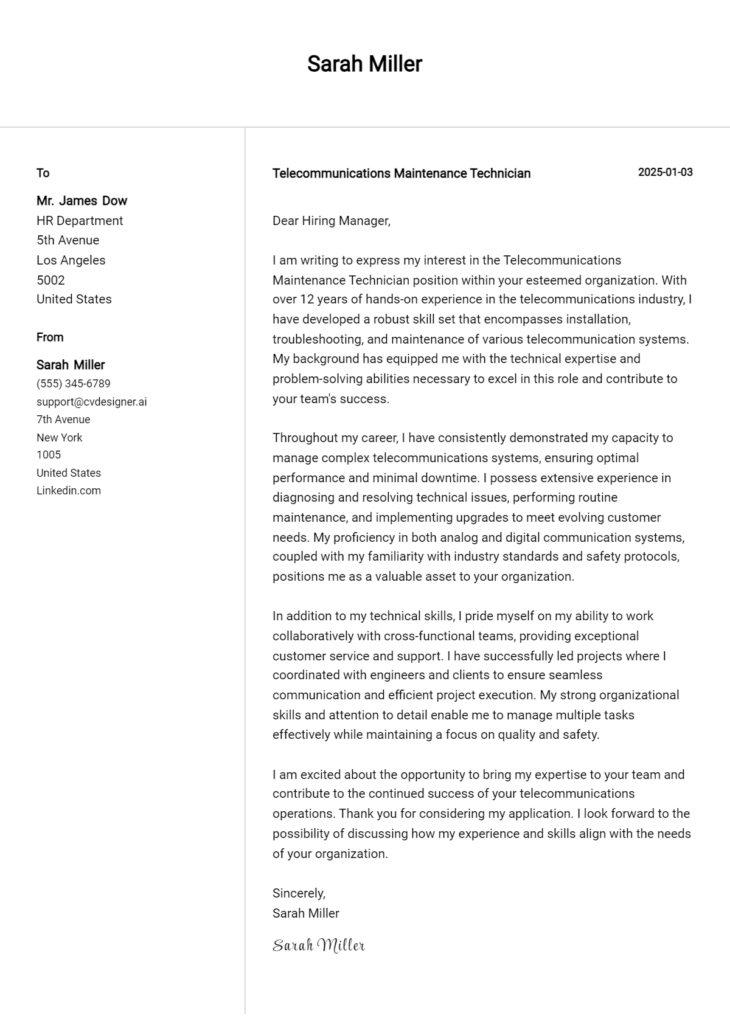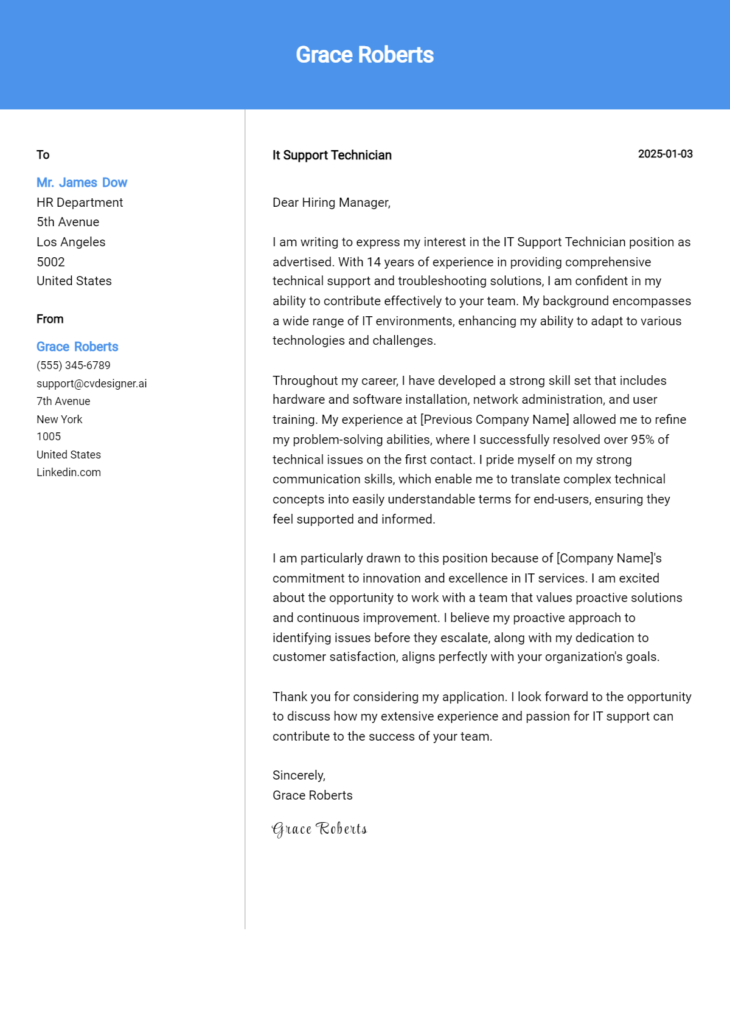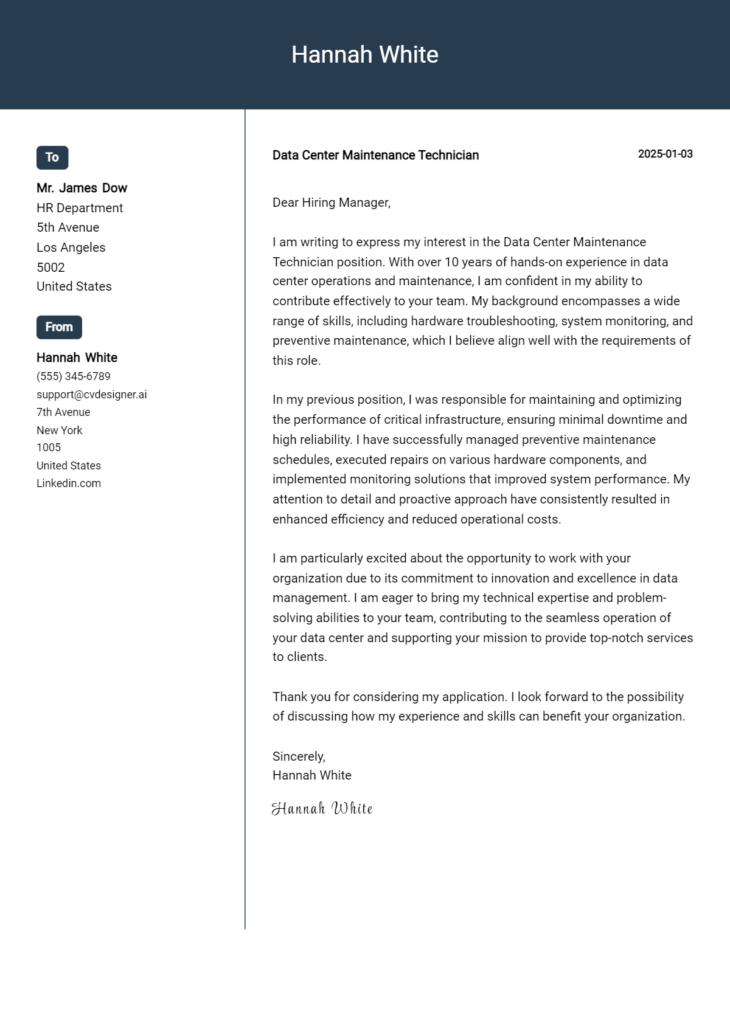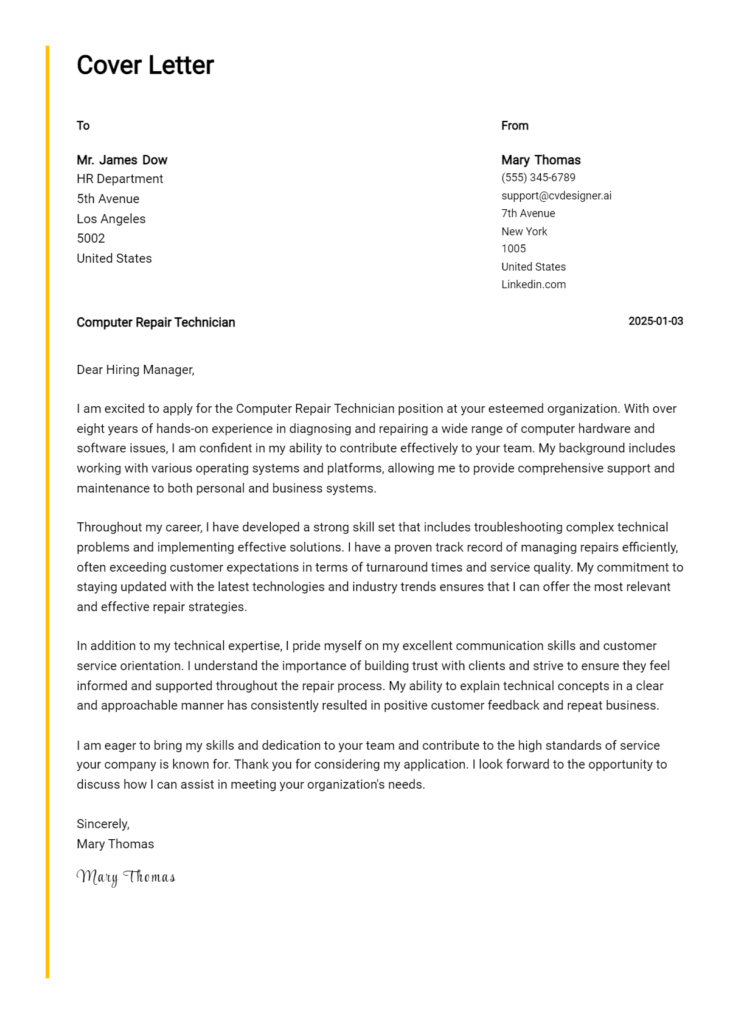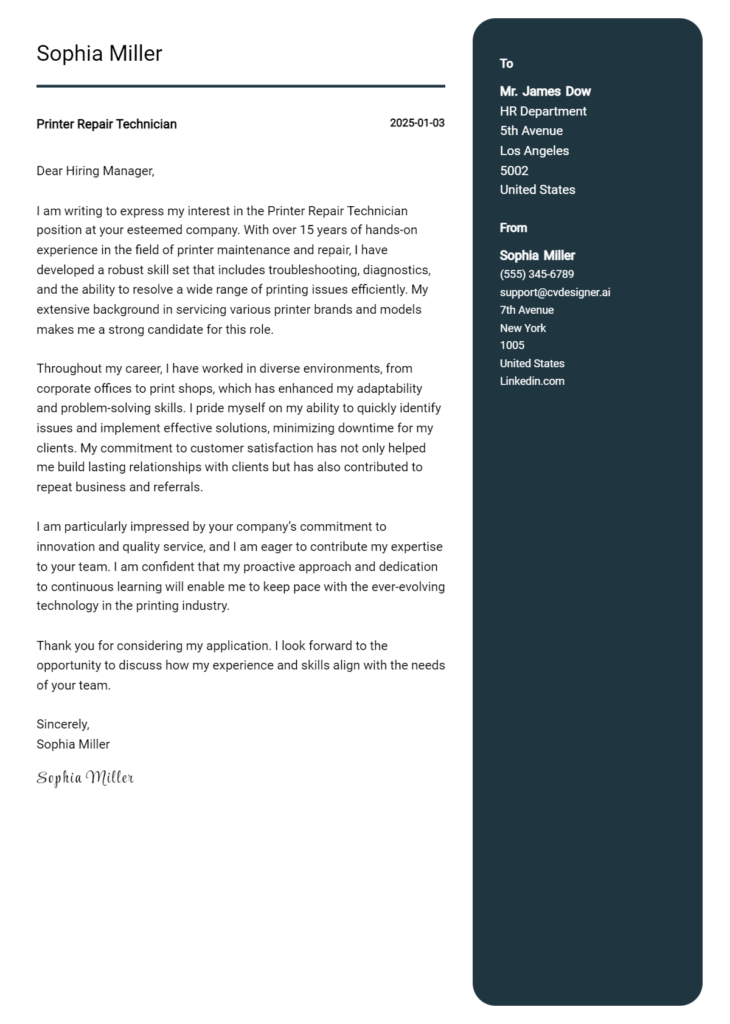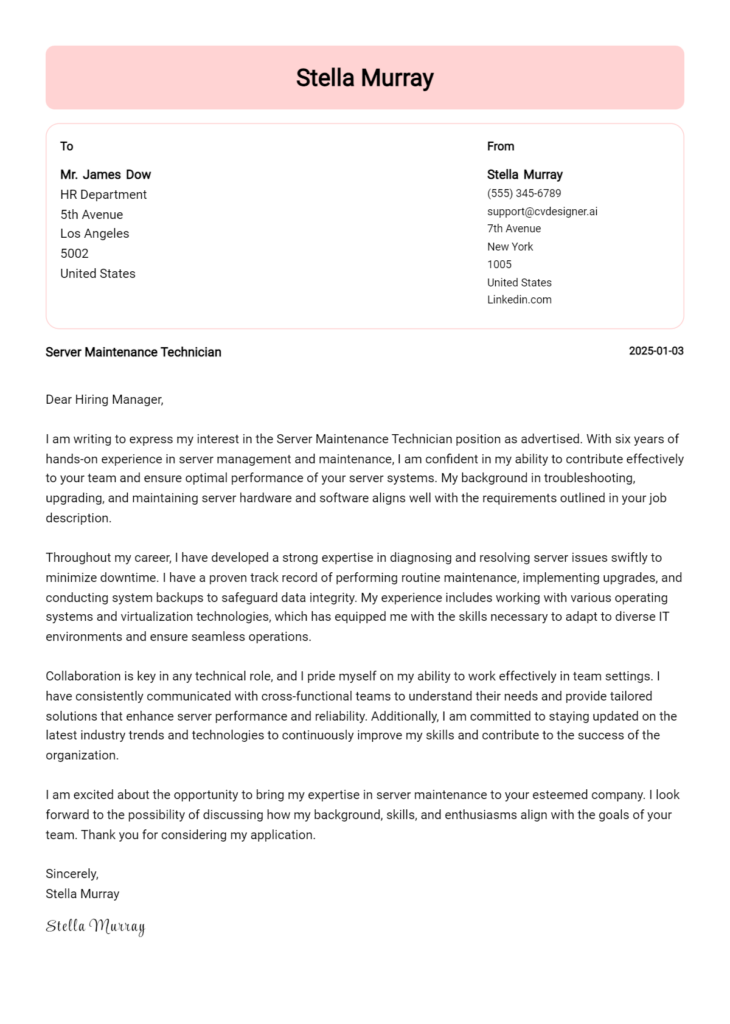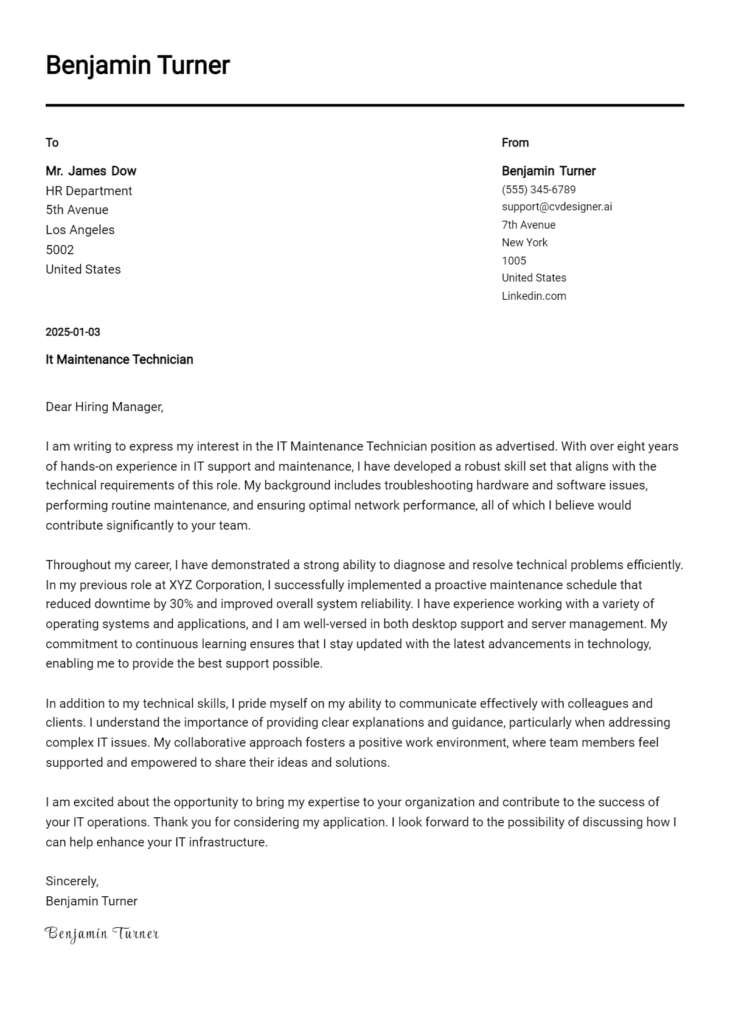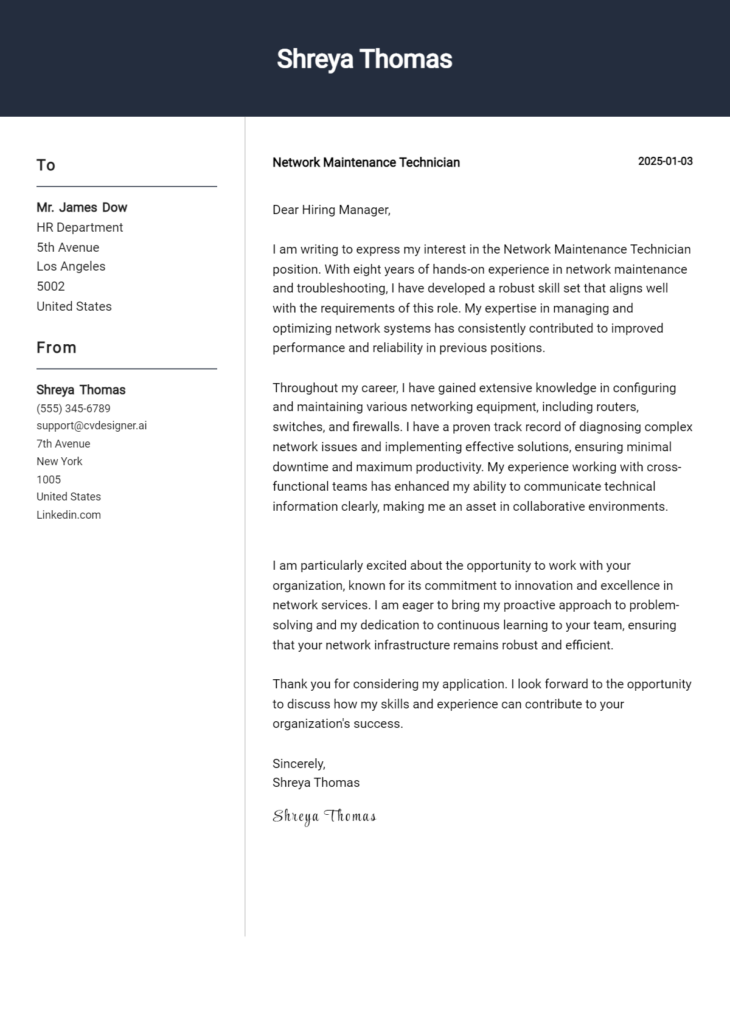Radio Frequency Rf Technician Cover Letter Examples
Explore additional Radio Frequency Rf Technician cover letter samples and guides and see what works for your level of experience or role.
How to Format a Radio Frequency (RF) Technician Cover Letter?
Crafting a compelling cover letter is essential for a Radio Frequency (RF) Technician, as it serves as your first impression to potential employers. The way you format your cover letter not only showcases your technical skills but also reflects your ability to communicate effectively—a critical requirement in the field of RF technology. A well-structured cover letter can capture the hiring manager's attention and demonstrate your attention to detail, which is paramount in ensuring optimal performance of radio frequency systems.
In this guide, we'll explore the key components of a professional cover letter, providing insights and RF technician-specific examples to help you create an impressive document.
We'll focus on the essential elements of a well-crafted cover letter, including:
- Cover Letter Header
- Cover Letter Greeting
- Cover Letter Introduction
- Cover Letter Body
- Cover Letter Closing
Each section is crucial in emphasizing your qualifications and professionalism. Let’s break down each part to help your RF technician cover letter stand out.
Importance of the Cover Letter Header for a Radio Frequency (RF) Technician
The cover letter header is a crucial element of your application as a Radio Frequency (RF) Technician, as it sets the tone for the professionalism and clarity of your correspondence. A well-structured header not only ensures that your contact information is easily accessible but also establishes your identity and the recipient's details. This section typically includes your name, address, phone number, email address, the date, and the recipient's name and title, along with the company’s name and address. Clarity in this part of your cover letter will reflect your attention to detail—a vital trait in the RF field where precision is key.
Strong Example
John Doe 1234 Signal Lane Tech City, TX 12345 (555) 123-4567 johndoe@email.com March 15, 2024 Jane Smith Hiring Manager Tech Solutions Inc. 5678 Frequency Blvd Tech City, TX 12345
Weak Example
JD 123 Signal St. (555) 123-4567 johndoe@email.com March 15, 2024 Hiring Manager Tech Solutions Inc.
The Importance of a Cover Letter Greeting for RF Technicians
The greeting of your cover letter is crucial as it sets the tone for the entire document. A well-crafted greeting demonstrates professionalism and shows that you have taken the time to personalize your application. By addressing the hiring manager directly, you create an immediate connection and convey your genuine interest in the position. To enhance this personalization, it's important to avoid generic greetings such as "To Whom It May Concern." Instead, take the time to research the recipient's name, which can often be found on the company’s website or LinkedIn. This small effort can make a significant impact on how your application is perceived.
Strong Greeting Example
Dear Mr. Smith,
Weak Greeting Example
To Whom It May Concern,
The Importance of a Well-Crafted Cover Letter Introduction for a Radio Frequency (RF) Technician
A well-crafted cover letter introduction is essential for capturing the hiring manager’s attention and setting the tone for the rest of your application. As a Radio Frequency (RF) Technician, your introduction should not only express your enthusiasm for the position but also highlight your relevant skills and achievements that make you an ideal candidate. This is your opportunity to make a strong first impression, showcasing your technical expertise and problem-solving abilities in the RF domain. A compelling introduction can differentiate you from other applicants and demonstrate your commitment to excelling in the role.
Strong Example
Dear [Hiring Manager's Name], I am excited to apply for the Radio Frequency (RF) Technician position at [Company Name] as advertised on [Job Board]. With over five years of hands-on experience in RF systems design and optimization, along with a proven track record of improving signal quality by 30% in previous projects, I am eager to bring my expertise and passion for technology to your innovative team. My extensive background in troubleshooting complex RF circuits and my commitment to staying updated with industry trends align perfectly with the goals of [Company Name].
Weak Example
To Whom It May Concern, I am writing to apply for the RF Technician job. I have worked in technology for a while and think I could do well in this position. I have some experience with RF systems, but I'm not sure if it is enough to meet your needs. I hope you consider my application.
Cover Letter Body for Radio Frequency (RF) Technician
The body of a cover letter for a Radio Frequency (RF) Technician is essential as it allows the candidate to effectively communicate their technical skills, relevant experiences, and the unique value they can bring to the company. This section should highlight specific projects or accomplishments that demonstrate proficiency in RF technologies, troubleshooting abilities, and hands-on experience with testing equipment. By presenting quantifiable results and successful project outcomes, candidates can differentiate themselves from others and provide tangible evidence of their capabilities, ultimately increasing their chances of securing an interview.
Strong Example
Dear Hiring Manager, As a dedicated Radio Frequency Technician with over five years of experience in the telecommunications industry, I have successfully contributed to several high-profile projects that enhanced network performance and reliability. For instance, while working at XYZ Communications, I led a team in a project that upgraded an existing RF system, resulting in a 30% increase in signal strength across a 20-mile radius. My hands-on expertise with spectrum analyzers and signal generators, coupled with my strong troubleshooting skills, allowed us to identify and rectify interference issues swiftly. I am confident that my technical acumen and proven track record of optimizing RF systems would be an asset to your team at ABC Technologies.
Weak Example
Dear Hiring Manager, I have worked as an RF Technician for a few years and have experience with various RF equipment. I think I would be a good fit for your company. In my previous job, I did some troubleshooting and helped with projects. I am familiar with the basics of RF technology, but I haven't worked on any specific projects that had measurable results. I am excited about the opportunity to work with your team and hope to learn more about RF systems in the future.
The Importance of a Cover Letter Closing for a Radio Frequency (RF) Technician
The closing paragraph of a cover letter is pivotal for an RF Technician as it encapsulates the candidate's qualifications, reaffirms their enthusiasm for the position, and prompts the employer to take action, such as reviewing the resume or scheduling an interview. A strong closing leaves a lasting impression and demonstrates professionalism, while a weak closing may fail to engage the reader and diminish the candidate's appeal.
Strong Example
Thank you for considering my application for the Radio Frequency Technician position at [Company Name]. With my extensive experience in RF design and troubleshooting, along with my passion for advancing communication technologies, I am excited about the possibility of contributing to your team. I look forward to the opportunity to discuss how my skills can align with your needs. Please feel free to review my resume for further details. I would be thrilled to schedule an interview at your convenience.
Weak Example
I hope you like my application. I think I would be a good fit for the RF Technician job. Let me know if you want to talk more about it or something.
These tips will assist candidates in crafting an effective cover letter for a Radio Frequency (RF) Technician position. A well-written cover letter is crucial for showcasing your technical skills, problem-solving abilities, knowledge of the Software Development Life Cycle (SDLC), teamwork experience, and a genuine passion for continuous learning in this field. By emphasizing these areas, you will stand out as a strong candidate to potential employers.
Tips for Writing an Effective Cover Letter
Highlight Your Technical Skills: Clearly outline your technical expertise related to RF technologies, including experience with RF simulation software, knowledge of circuit design, and familiarity with testing equipment. Mention specific tools or technologies you have mastered, as this demonstrates your qualifications for the role.
Demonstrate Problem-Solving Abilities: Provide examples of challenges you have faced in previous roles and how you successfully addressed them. Employers appreciate candidates who can think critically and develop effective solutions, especially in a technical field like RF engineering.
Showcase Your SDLC Knowledge: If you have experience with the Software Development Life Cycle or any related processes, include this in your cover letter. Explain how your understanding of SDLC contributes to your work as an RF Technician, especially in managing projects and ensuring quality outcomes.
Emphasize Teamwork and Collaboration: RF projects often require collaboration with other engineers, technicians, and departments. Highlight your ability to work well in teams, share knowledge, and communicate effectively with colleagues. Providing examples of successful teamwork can demonstrate your interpersonal skills.
Express a Passion for Continuous Learning: The RF industry is constantly evolving, so it's essential to convey your commitment to professional development. Mention any relevant certifications, training, or courses you have pursued, and express your eagerness to learn about new technologies and methodologies in the field.
By integrating these tips into your cover letter, you can create a compelling narrative that showcases your qualifications and enthusiasm for the role. For more inspiration, consider exploring our cover letter templates or utilize our cover letter builder to streamline the writing process.
Common Mistakes to Avoid in a Radio Frequency (RF) Technician Cover Letter
Crafting a cover letter for a Radio Frequency (RF) Technician position requires attention to detail and a clear presentation of relevant skills. Avoiding common mistakes is crucial for making a positive impression on hiring managers. Here are some frequent missteps to steer clear of:
- Generic Greetings: Failing to address the hiring manager by name can come off as impersonal. Always try to find the name or use a specific title.
- Lack of Specificity: Using vague language or failing to mention specific RF technologies you've worked with can weaken your application. Tailor your letter to include relevant technical skills and experiences.
- Excessive Length: A cover letter should be concise—ideally one page. Avoid rambling and focus on key achievements.
- Ignoring the Job Description: Not aligning your skills with the job requirements can be detrimental. Refer to the job posting and incorporate keywords to demonstrate your fit.
- Spelling and Grammar Errors: Typos can undermine your professionalism. Always proofread your letter or use tools to catch mistakes.
- Rehashing Your Resume: Your cover letter should complement your resume, not repeat it. Use this opportunity to highlight specific accomplishments or motivations.
- Neglecting to Show Enthusiasm: A lack of passion for the RF field can be a red flag. Express your interest in the role and the company to convey genuine enthusiasm.
For more guidance on crafting an effective cover letter, check out cover letter examples and learn about the proper cover letter format.
Cover Letter FAQs for Radio Frequency (RF) Technician
What should I include in my cover letter for an RF Technician position?
In your cover letter, highlight your technical skills and relevant experience in radio frequency technology. Include specific details about your proficiency with RF testing equipment, signal analysis, and troubleshooting techniques. Mention any certifications or training you have completed, such as FCC licensing or coursework in RF engineering. It's also important to showcase your problem-solving abilities and your experience working in collaborative environments. Tailor your letter to the specific job description, emphasizing how your skills align with the company’s needs and goals.
How can I demonstrate my expertise in RF technology in my cover letter?
To demonstrate your expertise, provide concrete examples of past projects or roles where you successfully used RF technology. Describe your experience with designing, testing, or maintaining RF systems, as well as any familiarity with industry standards and regulations. If you've worked with specific RF equipment or software, such as spectrum analyzers or network analyzers, mention them. Additionally, discussing any challenges you faced and how you overcame them will illustrate your hands-on experience and problem-solving skills, making your cover letter stand out.
Should I address my cover letter to a specific person?
Yes, addressing your cover letter to a specific person can make a positive impression. If the job listing includes a hiring manager's name, use it to personalize your letter. If no name is provided, you can often find this information on the company’s website or LinkedIn. Personalizing your cover letter shows that you've done your research and are genuinely interested in the position. If you're unable to find a name, a general greeting such as "Dear Hiring Manager" is acceptable, but strive for personalization whenever possible.
How long should my cover letter be for an RF Technician role?
Your cover letter should ideally be one page long, consisting of 3 to 4 paragraphs. Aim for a concise and focused letter that highlights your qualifications without overwhelming the reader with information. Start with an engaging introduction that states your interest in the position and briefly outlines your experience. Follow up with 1 or 2 paragraphs detailing your relevant skills and accomplishments. Conclude with a strong closing statement that expresses your enthusiasm for the role and encourages the reader to contact you for an interview. Keeping it succinct ensures that your key points are easily digestible.
Build your Cover Letter in minutes
Use an AI-powered cover letter builder and have your letter done in 5 minutes. Just select your template and our software will guide you through the process.

